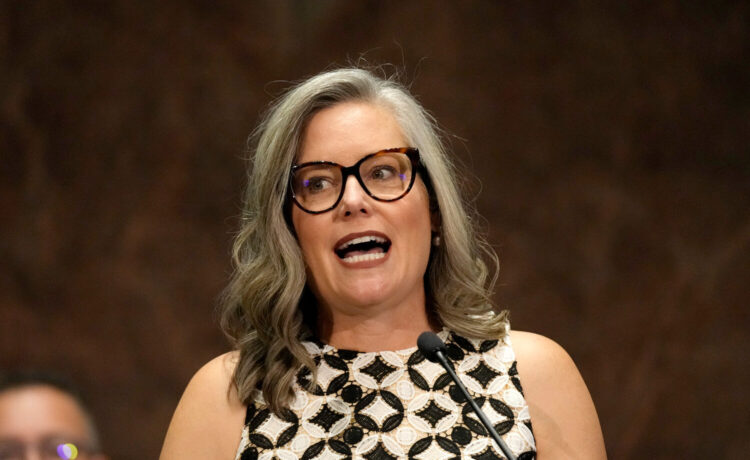PHOENIX — Gov. Katie Hobbs and state lawmakers are asking a judge to immediately overturn a Thursday order that blocks the state, at leat for now, from seizing money from the opioid settlement fund.
And her attorney, David Gaona, said Friday Attorney General Kris Mayes was playing fast and loose in the way she got a court commissioner late Thursday to bar the transfer.
In new filings, Gaona told Maricopa County Superior Court Judge Scott Minder that Mayes filed her request for a temporary restraining order before notifying the Department of Administration, the state agency charged with moving the funds to the Department of Corrections, Rehabilitation and Reentry. In fact, Gaona said, by the time he actually got a chance to look the attorney general’s filing, court Commissioner Mary Cronin had already granted a temporary restraining order.
At the very least, Gaona said, Mayes failed to provide an affidavit alleging the necessary facts to get such an order. But he told Minder in his legal filing that the way Mayes handled the whole thing was improper.
“This is simply not how we practice law in Arizona,” he wrote.
“The attorney general’s counsel could have called someone earlier in the day or even on the way to the courthouse to let them know this was happening instead of hitting a critical state agency with a last-minute email,” Gaona said, when there was no way for lawyers or the governor to “be meaningfully heard.”
What that also meant, he said, is that the commissioner got only one side of the story.
“What the attorney general didn’t tell Commissioner Cronin — and what the attorney general’s maneuvering ensured neither the Department of Administration or other parties could tell the court — is that her claims have serious legal deficiencies,” Gaona said.
That starts, he said, with the fact the $115 million at issue is part of a budget deal worked out between Hobbs and Republican legislative leaders. Gaona said they are the ones with the authority to appropriate state funds, not the attorney general.
Mayes press aide Richie Taylor declined immediate comment.
The attorney general filed suit late Thursday, getting a temporary restraining order after arguing to Cronin the money is part of $1.14 billion the state got in settlements with opioid manufacturers, distributors and pharmacies who were accused of causing and exacerbating use of the drug. More to the point, Mayes contends the agreement, approved by a federal judge, requires that her office review requests and determine which programs to fund.
By contrast, the budget simply directs $75 million to go to the Department of Corrections now, a move that ensures the state ends the fiscal year on June 30 with a balanced budget. The other $40 million is earmarked for the agency for the new budget year.
Cronin, without hearing from the governor, agreed Thursday to block the move based at least in part on Mayes’ claim that allowing the funds to be taken in this way would endanger future payments.
It isn’t just Hobbs who is urging Minder to dissolve the restraining order.
The governor filed a joint motion Friday with legislative leaders detailing the “painstaking hours” it took to adopt a $17.2 billion spending plan for the balance of this fiscal year and $16.1 billion for the new year. That, they said, involved “a string of difficult tradeoffs.”
But it did result in a budget that gathered both Republican and Democratic votes “placing Arizona on solid financial ground for the upcoming fiscal year.”
“Despite this success, however, the attorney general has exceeded her authority and decided to torpedo those efforts, premised on her own preferred public policy prerogatives,” their attorneys wrote.
Alleged problems with the restraining order aside, Gaona wants Minder to conclude the funds being transferred to the Department of Corrections are within the permitted uses under the settlement agreement. He pointed out the language in the budget spells out that the agency can use the transferred funds only to pay for allowable expenses.
And Gaona said they clearly are there.
He said in this budget year — the one that ends on June 30 — the Department of Corrections has incurred at least $45 million in costs for opioid-related treatment. And Gaona said some of those invoices from the companies that provide health care and medicine to the agency have yet to be paid.
If the bills aren’t paid in a timely fashion, he said, the state risks future litigation, fees and interest.
Gaona is hoping to get a hearing in front of Minder by Monday.














